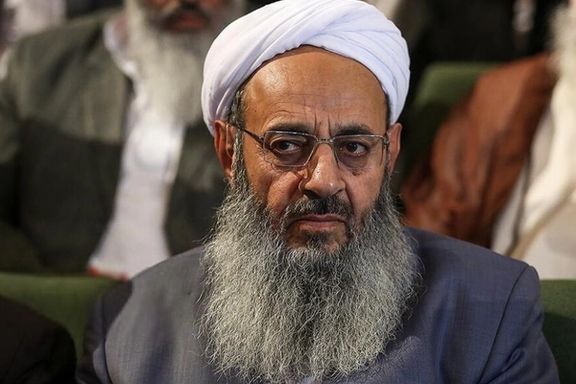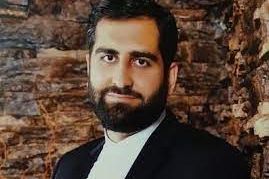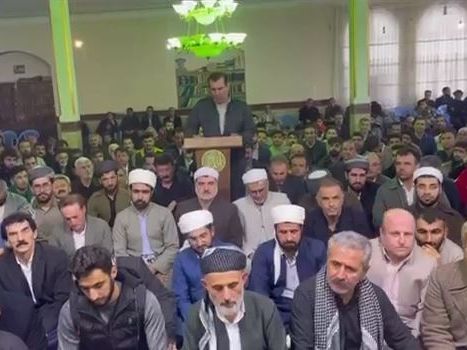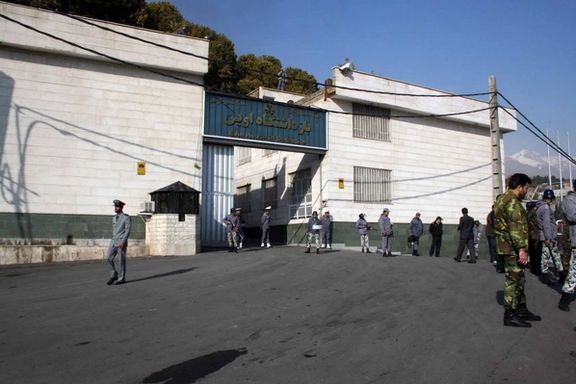Iranian Sunni Leader Under Pressure To End Weekly Protests In Zahedan

Reports say Sunni religious leader of Zahedan, Mowlavi Abdolhamid, has been under pressure by Iranian security to end his weekly protests and critical sermons on Fridays.

Reports say Sunni religious leader of Zahedan, Mowlavi Abdolhamid, has been under pressure by Iranian security to end his weekly protests and critical sermons on Fridays.
Halvash website that covers Baluchestan events reported Thursday that "Mowlavi Abdolhamid has rejected the requests by the security organizations".
Since September during ongoing protests following the death of 22-year-old Mahsa Amini in police custody, Mowlavi Abdolhamid has made fiery speeches against the heavy crackdown and killing of protesters, calling government actions "felony".
He has also called for holding a referendum in Iran with the presence of international observers.
The Sunni city of Zahedan in the southeastern Sistan-Baluchestan province has been witnessing protests against repressions and discriminations in the province following mass Friday prayers during the past thirteen weeks.
According to Halvash, Thursday evening a large number of military forces and plainclothes agents have been stationed in the schools of Zahedan to repress any protests on Friday January 6.
Meanwhile, other reports say during the past four days, at least 113 Baluch citizens and children have been arrested in different regions of Zahedan by security agencies.

Iran International has learned that Ghasem Fathollahi, an officer of the Revolutionary Guards who was killed in Tehran, was assassinated by the IRGC intelligence.
Fathollahi, a commander of Basij militia unit in one of the neighborhoods of the capital Tehran, was killed Tuesday outside his home after being shot four times by a gunman who fled the scene on a motorcycle. He succumbed to his injuries at a hospital near his place of residence.
He was the commander of the basij base of a mosque in Khani Abad in Tehran, District 12 downtown Tehran.
Initial reports suggested that he was killed by the people opposed the clerical regime, but later sources close to the IRGC claimed that he was killed during a robbery. On Thursday, sources told Iran International that he was shot dead by IRGC intelligence agents due to his leniency towards protesters.
According to our sources, the Intelligence Organization of the IRGC had become suspicious of Fatollahi in the past few weeks and had been monitoring him. The sources said that he refused to confront the demonstrators and suppress them during the protests in the area. The regime uses the Basij paramilitary militia extensively against demonstrators. They are hated by many citizens for acting as mercenaries who are willing to use violence indiscriminately against civilians.
Investigating his conduct, IRGC’s intelligence found out that he was not alone and was in contact with a group of the disgruntled members of security forces who tried to refrain from using deadly violence against protesters, including opening fire at them.
According to Iran International's sources, the Revolutionary Guard Intelligence Organization is worried about the growing number of security forces who refuse to confront the protesters and has taken measures to deal with this trend.
He was apparently using a PlayStation device to keep in touch with a network of protesters. The assailant or someone who reportedly accompanied him took this PlayStation device too.
In the past months, there have been several reports that protesters in different cities have been using private chat rooms available in online games on Sony’s PlayStation network to coordinate street demonstrations. The number of games available on PlayStation is countless, and this issue makes it impossible to track and monitor their conversations.
It is not yet clear whether Fathollahi’s killing was a pre-meditated, deliberate full-fledged hit operation or only a collateral incident during the attempt to seize the PlayStation and arrest him.
Earlier in June, Iran International’s sources said that a commander of IRGC Quds Force unit 840 -- Colonel Ali Esmailzadeh, who died under suspicious circumstances in Karaj on May 30, was an inside job. Esmailzadeh died when he fell from the roof of his home in Jahan Nama area of Karaj.
He was a close colleague of Colonel Hassan Sayyad-Khodaei, the acting commander of the elite Qods Unit 840, who was shot dead behind the wheel of his car outside his home in Tehran on May 22 by two gunmen who fled the scene on a motorbike.

Reports say Sunni religious leader of Zahedan, Mowlavi Abdolhamid, has been under pressure by Iranian security to end his weekly protests and critical sermons on Fridays.
Halvash website that covers Baluchestan events reported Thursday that "Mowlavi Abdolhamid has rejected the requests by the security organizations".
Since September during ongoing protests following the death of 22-year-old Mahsa Amini in police custody, MowlaviAbdolhamid has made fiery speeches against the heavy crackdown and killing of protesters, calling government actions "felony".
He has also called for holding a referendum in Iran with the presence of international observers.
The Sunni city of Zahedan in the southeastern Sistan-Baluchestan province has been witnessing protests against repressions and discriminations in the province following mass Friday prayers during the past thirteen weeks.
According to Halvash, Thursday evening a large number of military forces and plainclothes agents have been stationed in the schools of Zahedan to repress any protests on Friday January 6.
Meanwhile, other reports say during the past four days, at least 113 Baluch citizens and children have been arrested in different regions of Zahedan by security agencies.

A group of clerics, activists, and other prominent figures in Iran’s Kurdish-majority city of Javanrud have called on the Islamic Republic to end its military siege aimed at ending protests.
In a statement read out in a video message, they urged the regime to end “the economic and military siege" of the city, as well as to stop creating the atmosphere of fear and insecurity.
They also mentioned the situation in the country as evidence of the continuation of the "violent crackdown” on people of the city, calling for ending the repression and releasing people who were arrested during recent protests.
They criticized the regime’s increasing use of military force in the city that has led to widespread anxiety, and crisis in the city.
In addition to Javanrud in western Kermanshah province, they also denounced the military atmosphere of other places, especially cities with Kurdish population in western Iran, and Baluchi population in Sistan-Baluchistan province as well as the city of Semirom in the central Esfahan province.
The military checkpoints at the gates of these cities should be removed so that normal life can be restored for the residents of these cities, they added.
Late in December, security forces attacked the memorial services of some of the protesters that were killed earlier in the city, shooting one more person to death. Since then, clashes have intensified between people and the security forces, most of whom are deployed from other locations to the city of about 50,000 residents. According to local sources, regime agents have stepped up the atmosphere of terror and repression, raiding the homes at night without any court order and arresting people.
Erfan Kakaie, Bahaoddin Veisi, Tahsin Miri, Masoud Teimuri, Jamal Azami, Johar Fatahi and Esmail Gol Anbar were killed by government forces during the bloody protests on November 20 and 21 in Javanrud. The ceremony to mark the fortieth day after their death was supposed to be attended by a large crowd of people last Saturday, December 31. Regime forces fired live rounds and tear gas at the people attending the procession, killing a 22-year-old resident identified as Borhan Eliasi.
Iran's Kurdish cities have been at the forefront of the protests that started with the death in custody of 22-year-old Mahsa Amini from the Kurdish city of Saqqez in mid-September. People in most Kurdish-populated areas in Kordestan, West Azarbaijan and Kermanshah provinces have relentlessly protested and defied government forces since Amini’s death.
The situation is not as tense in other parts of the country, but issuing death sentences as well as long prison terms for detained protesters continues. Pressures on the families of the dead and detained protesters are unrelenting and still there are reports of unexplained deaths of prisoners within a few days after their release.
Meanwhile, following the finalization of the death sentence of Mohammad-Mehdi Karami and Mohammad Hosseini, who are sentenced to death for the alleged murder of a pro-regime Basij member during a protest near Tehran on November 3, the situation at the prison they are being kept in is also tense.
On Wednesday, two members of the Australian House of Representatives -- Keith Wolahan and Aaron Violi -- called on the Islamic Republic to stop issuing death sentences for people arrested in recent protests. They also offered to take political sponsorship for fifteen imprisoned protestors who are facing the death sentence. “Mohammed Mehdi Karami is only 22 years of age and has just been sentenced to death for protesting,” said Wolahan in a letter to the Charge d'affaires of the Islamic Republic in Australia.
Amid increasing pressure on detained protestors, the wave of hunger strikes in prisons is on the rise with the detainees’ health in danger. Armita Abbasi, and over a dozen other female prisoners in Kachouie prison of Karaj, west of Tehran, have gone on hunger strike since Monday to protest their indefinite detention, lack of access to lawyers and the danger of harsh verdicts.

An Iranian member of parliament from Sistan-Baluchestan province has criticized bread and gasoline shortages, reporting long queues at gas stations and bakeries.
ISNA news agency in Tehran quoted Abdol Naser Derakhshan Thursday as saying that the shortage of bread and gasoline in various cities of the relatively poor province has worsened during the past few days. Sistan-Baluchistan in the southeast has a large Baluch ethnic population who are mostly Sunni.
On Sunday, Ismail Hosseinzahi, representative of Khash in parliament also said that the people of Sistan-Baluchistan stand in queues for bread almost three hours and the fuel queues reach three kilometers.
In response to criticisms, the general manager of grains department of the province denied the "shortage of flour" saying that long queues to buy bread are only formed at weekends as people worry about regular protest on Fridays.
Baluch citizens and activists believe the shortages are systematic and aimed at increasing pressure on people due to their weekly protests within the past thirteen weeks.
The Sunni population of the provincial capital Zahedan have been holding antigovernment rallies for more than 3 months. On September 30, security forces opened fire on civilians killing more than 93 protesters and onlookers.
They say pressures have increased in the past two weeks after the appointment of Mohammad Karami, a senior IRGC commander as governor of Sistan-Baluchestan.
Reports say security forces have arrested more than 100 Baluch citizens since past week on the pretext of fighting criminals and illegal foreign nationals.

Since protests began, regime agents have arrested nearly 20,000 Iranians during or between rounds of protests, many have been released but a few died apparently with no certain reason.
Fatemeh Mohammadi, who was freed earlier in the week, was fortunate enough that she went through some detoxification process immediately after her release, but 19-year-old Yalda Aghafazli died last month after being released from prison without any medical preconditions.
At the hospital, tests indicated a significant amount of narcotics in her blood system. According to reports, many of her friends who were arrested during protests and were later released have shown similar symptoms of poisoning.
Mehdi Zare Ashkzari was an Iranian student at the University of Bologna, Italy, who had traveled to Iran for the funeral service of his mother. He was arrested during the Iranian protests and fell into a coma after release and died 20 days later this week. In his case, reports say he had suffered intense tortures.
Some of those who die after time in prison commit suicide. There are allegations that most of the detainees were force-fed heavy doses of drugs during the days at the detention centers, that seems to heighten suicidal thoughts.
In November, Arshia Emamgholizadeh, 16, was arrested in East Azarbaijan province for tossing a turban of a cleric, which has become a new symbolic act of protest. He was kept in prison for ten days. After ten days, he was released on bail. Arshia committed suicide two days later. He had told his friends that prison authorities gave them some pills to swallow every night, as well as torturing them.
Dr. Maziar Ashrafian Bonab, UK-based forensic and medical geneticist, told Iran International in early December that there is probably no mysterious drug involved but the psychological trauma that these young adults went through made them suicidal. However, he cited some reports that said suicidal ideation heightens after intake of derivatives of potassium aspartate. Such medicine can lead to instant death in high doses and suicidal thoughts in lower doses.
He also called on all those who are released from the regime’s prisons to take blood and mineral tests as soon as they get out. According to a study at the UK and reported by the Guardian, even the happy drug Prozac class of antidepressants can make healthy men, women and children with no history of depression feel suicidal.
Some doctors believe that whatever they are taking in detention, the abrupt stop of the drug causes suicidal tendencies, because there are many psychiatric medicines that should be tapered out otherwise their withdrawals lead to serious damage.
A group of members of the medical community -- who called themselves The Physicians' Unity (Etehad Pezeshkan) -- has called on international bodies to probe the deaths of the Iranian protesters. Many people are of the opinion that the authorities are intentionally killing the protesters without actually taking responsibility for them to avoid international outcry.
Such reports about the death of prisoners after release are not limited only to the last three to four months of protests, but the frequency of such deaths has never been so high. For instance, Siavash Bahrami, a Kurdish political prisoner, died three days after his release in May 2022. Hengaw, a Norway-based rights group which monitors abuses in Kurdish areas, reported at the time that he was injected with some unknown substance in the prison.
The Islamic Republic is killing its critics in so many ways now, from shooting them on the streets to executions, torture and psychological pressure. Earlier in the week, Maryam Salimian, an Iranian painter, committed suicide after she found out at the airport that she is banned from leaving the country to pursue her passion after she was admitted to a university in Austria.